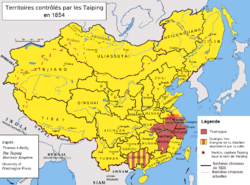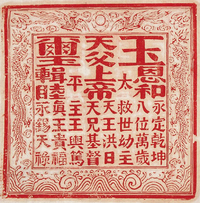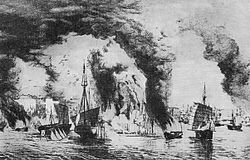Taiping Heavenly Kingdom
Heavenly Kingdom of Great Peace 太平天囯 | |||||||||
|---|---|---|---|---|---|---|---|---|---|
| 1851–1864 | |||||||||
 Greatest extent (maroon) of the Taiping Heavenly Kingdom. | |||||||||
| Capital | Tianjing (天京) | ||||||||
| Common languages | Chinese | ||||||||
| Religion | God Worshippers | ||||||||
| Government | Heterodox Christian Theocracy & Absolute Monarchy | ||||||||
| Heavenly King of Great Peace | |||||||||
• 1851–1864 | Hong Xiuquan | ||||||||
• 1864 | Hong Tianguifu | ||||||||
| Kings | |||||||||
| Historical era | Qing Dynasty | ||||||||
| January 11 1851 | |||||||||
• Capture of Nanking | March 1853 | ||||||||
| 1856 | |||||||||
• Death of Hong Tianguifu | November 18 1864 | ||||||||
| Currency | Holy Treasure | ||||||||
| |||||||||
The Taiping Heavenly Kingdom (Chinese: 太平![]() 囯,1 pinyin: Tàipíng Tiānguó; Hakka: Thai-phìn Thiên-koet, lit. "Great Peaceful Kingdom of Heaven" or "Heavenly Kingdom") was an oppositional state in China from 1851 to 1864, established by Hong Xiuquan, the leader of the Taiping Rebellion (1850–1864). Its capital was at Tianjing (
囯,1 pinyin: Tàipíng Tiānguó; Hakka: Thai-phìn Thiên-koet, lit. "Great Peaceful Kingdom of Heaven" or "Heavenly Kingdom") was an oppositional state in China from 1851 to 1864, established by Hong Xiuquan, the leader of the Taiping Rebellion (1850–1864). Its capital was at Tianjing (![]() 京, Wade-Giles: Tienching, "Heavenly Capital"), present-day Nanjing.
京, Wade-Giles: Tienching, "Heavenly Capital"), present-day Nanjing.
A heterodox Christian convert, Hong led an army that controlled much of southern China, with about 30 million people. The rebel Kingdom announced social reforms and the replacement of Confucianism, Buddhism and Chinese folk religion by a form of Christianity, holding that Hong Xiuquan was the younger brother of Jesus. The Taiping areas were besieged by Qing forces throughout most of the rebellion. The Qing government defeated the rebellion with the eventual aid of French and British forces. The conflict was one of the deadliest wars in history, with about 25 million killed, mainly civilians.
History of the Taiping Rebellion

Origins of the Rebellion
In the mid-19th century, China under the Qing Dynasty suffered a series of natural disasters, economic problems, and defeats at the hands of the Western powers, in particular, the humiliating defeat in 1842 by the United Kingdom in the First Opium War. The Qing, ethnically Manchu, were seen by much of the Chinese population, majority Han, as ineffective and corrupt foreign rulers. Anti-Manchu sentiment was strongest in the south among the laboring classes, and it was these disaffected who flocked to join the charismatic visionary Hong Xiuquan.
After Hong failed to pass the examinations that would make him one of the elite, he studied the Bible with the help of a Protestant missionary. One day he claimed to have had a vision to the effect that he was the younger brother of Jesus. After his vision, he felt it was his duty to spread Christianity and overthrow the foreign rule of the Qing. Hong's associate Yang Xiuqing was a former firewood salesman of Guangxi, who claimed to be able to act as a voice of God to direct the people and gain political power.
Feng Yunshan formed the Society of God Worshippers (Chinese: 拜上帝会, Pinyin: Bai Shangdi Hui), in Guangxi province after a missionary journey there in 1844 to spread Hong's ideas.[1] In 1847 Hong become the leader of the secret society.[2] The sect's power grew in the late 1840s, initially suppressing groups of bandits and pirates, but persecution by Qing authorities spurred the movement into a guerrilla rebellion and then into civil war.
Hong's religion
According to an assessment in the Encyclopædia Britannica, Hong's Christian ideology was largely concerned with the suppression of vices, as formulated in the Old Testament, and ignored "New Testament ideas of humility and kindness", as well as "the Christian ideas of original sin and redemption."[3]
In 1847 Hong went to Guangzhou to study Christianity with the Rev. I. J. Roberts, an American missionary. The two months he spent with Roberts marked his sole formal training in the doctrines of Christianity... Hong's contacts with Western Christianity did, however, teach him that there were other countries in the world. Rather than the traditional Chinese ethnocentrism, he postulated a world of many nations, all of them equal under God. Moreover, he was iconoclastic in his attitude toward the Chinese culture of his day, labeling it the work of evil demons and insisting that all symbols of it be destroyed.
Establishment of the Kingdom
The Taiping Rebellion began in 1850 in Guangxi Province. By early January 1851, a ten thousand-strong rebel army had had routed Imperial troops in the Jintian Uprising. On January 11, 1851, his birthday, Hong Xiuquan declared himself "Heavenly King" (![]() 王, Tianwang) of a new dynasty, the "Heavenly Kingdom of Great Peace".[3][4]
王, Tianwang) of a new dynasty, the "Heavenly Kingdom of Great Peace".[3][4]
Capital at Tianjing (Nanjing)

In 1853 the Taiping forces captured Nanjing, making it their capital and renaming it Tianjing, "Heavenly Capital". Hong built his Palace of Heavenly King there by converting the former residence of Qing officials.
At its height, the Heavenly Kingdom encompassed much of south and central China, centered on the fertile Yangtze river valley. Control of the river meant that the Taipings could easily supply their capital. From there, the Taipings sent armies west into the upper reaches of the Yangtze, and north to capture the Imperial capital of Beijing. The attempt to take Beijing failed.
Internal conflict
In 1853 Hong withdrew from active control of policies and administration, ruling exclusively by written proclamations often in religious language. Hong disagreed with Yang in certain matters of policy and became increasingly suspicious of Yang's ambitions, his extensive network of spies, and his declarations when "speaking as God". Yang and his family were put to death by Hong's followers in 1856, followed by the killing of troops loyal to Yang.[5]
With their leader largely out of the picture, Taiping delegates tried to widen their popular support with the Chinese middle classes and forge alliances with European powers, but failed on both counts. The Europeans decided to stay neutral. Inside China, the rebellion faced resistance from the traditionalist middle class because of their hostility to Chinese customs and Confucian values. The land-owning upper class, unsettled by the Taipings' peasant mannerisms and their policy of strict separation of the sexes, even for married couples, sided with the Imperial forces and their Western allies.
In 1859 Hong Rengan, a cousin of Hong, joined the Taiping in Nanjing, and was given considerable power by Hong. He developed an ambitious plan to expand the Kingdom's boundaries. In 1860 the Taiping were successful in taking Hangzhou and Suzhou to the east (See also: Second rout of the Army Group Jiangnan), but failed to take Shanghai, which marked the beginning of the decline of the Kingdom.
The fall of the Kingdom


An attempt to take Shanghai in August 1860 was initially successful but finally repulsed by a force of Chinese troops and European officers under the command of Frederick Townsend Ward.[6] This army would later become the "Ever Victorious Army", led by "Chinese" Gordon, and would be instrumental in the defeat of the Taiping rebels. Imperial forces were reorganized under the command of Zeng Guofan and Li Hongzhang, and the Imperial reconquest began in earnest. By early 1864 Imperial control in most areas was well established.
Hong declared that God would defend Nanjing, but in June 1864, with Imperial forces approaching, he died of food poisoning as the result of eating wild vegetables as the city began to run out of food. He was sick for twenty days before the Imperial forces could take the city. Only a few days after his death the Imperial forces took the city. His body was buried in the former Ming Imperial Palace where it was later exhumed by the conquering Zeng to verify his death, and cremated. Hong's ashes were later blasted out of a cannon in order to ensure that his remains have no resting place as eternal punishment for the uprising.
Four months before the fall of the Heavenly Kingdom of Taiping, Hong Xiuquan abdicated in favour of Hong Tianguifu, his eldest son, fifteen years old. Hong Tianguifu was unable to do anything to restore the Kingdom, so the Kingdom was quickly destroyed when Nanjing fell in July 1864 to the Imperial armies after vicious street-by-street fighting. Most of the princes were executed by Qing Imperials in Jinling Town (金陵城), Nanjing.
Although the fall of Nanjing in 1864 marked the destruction of the Taiping regime, the fight was not yet over. There were still several hundred thousand Taiping rebel troops continuing the fight, with more than a quarter million fighting in the border regions of Jiangxi and Fujian. It would take seven years to finally put down all remnants of the Taiping Rebellion. In August 1871 the last Taiping rebel army, led by Shi Dakai's commander, General Li Fuzhong (李福忠), was completely wiped out by the Imperial forces in the border region of Hunan, Guizhou and Guangxi.
The Heavenly Kingdom's policies
Within the land that it controlled, the Taiping Heavenly Army established a theocratic and highly militarized rule.
- The subject of study for the examinations for officials (formerly civil service exams) changed from the Confucian classics to the Bible.
- Private property ownership was abolished and all land was held and distributed by the state.
- A solar calendar replaced the lunar calendar.
- Foot binding was banned. (The Hakka people had never followed this tradition, and consequently the Hakka women had always been able to work the fields.[7])
- The society was declared classless and the sexes were declared equal. It was the first Chinese regime ever to admit women to examinations.
- The sexes were rigorously separated; there were separate army units consisting of women only; until 1855, not even married couples were allowed to live together or have sexual relations.[8]
- The Qing-dictated queue hairstyle was abandoned in favor of wearing the hair long.
- Other new laws were promulgated including the prohibition of opium, gambling, tobacco, alcohol, polygamy (including concubinage), slavery, and prostitution. These all carried draconian penalties.
Theology
Although ostensibly Christian, the "Heavenly Kingdom of Great Peace" has long been considered heretical by major branches of Christianity.
The movement's founder, Hong Xiuquan, had tried and failed to earn his shengyuan civil service degree numerous times. After one such failure in 1836, Hong overheard a Chinese Protestant missionary (Liang Fa) preaching and took home some Chinese translations of Bible tracts which had been translated by Robert Morrison, including a pamphlet titled "Good Words for Exhorting the Age" by Liang Fa. "Hong and his cousin were both baptized in accordance with Liang's directions.[9] The missionary was probably Edwin Stevens of New England, who operated illegally in China.[10] In 1843, after Hong's final failure at the exams, he had what some regard as a nervous breakdown and others as a mystical revelation, connecting his in-depth readings of the Christian tracts to strange dreams he had been having for the past six years. In his dreams, a bearded man with golden hair and a black robe called himself Jehovah, gave him a sword, and taught him to slay demons beside a younger man whom Hong addressed as "Elder Brother".[11]
Hong Xiuquan came to believe that the figures in his dreams were God the Father and Jesus Christ the Son and that they were revealing his destiny as a slayer of demons and the leader of a new Heavenly Kingdom on Earth.[12] The demons were later interpreted by him to be the Qing and false religions.
Hong developed a literalist understanding of the Bible and added a third testament of annotations to the Taiping's Bible. These developed a Oneness theology.[citation needed] He rejected the doctrine of the Trinity, saying "God is the Father and embodies myriads of phenomena; Christ is the Son, who was manifest in the body... The Wind of the Holy Spirit, God, is also a Son... God is one who gives shapes to things, molds things into forms, who created heaven and created earth, who begins and ends all things, yet has no beginning or end himself..." and " God and the Savior are one. " [13]
Hong's deputy Yang Xiuqing later took the title "Comforting Holy Wind", as he was keen to gain titles.[citation needed] Yang Xiuqing's religious motivations are disputed.
Currency
In its first year, the Heavenly Kingdom minted coins that were 23 mm to 26 mm in diameter, weighing around 4.1 g. The kingdom's name was inscribed on the obverse and "Holy Treasure" (Chinese: 聖寶) on the reverse.
Administration


Ranked below the "King of Heaven" Hong Xiuquan, the territory was divided among provincial rulers called kings or princes, initially there were five – the Kings of the Four Quarters and the King of the Yi ("flanks"[citation needed]). Of the original rulers, the West King and South King were killed in combat in 1852. The East King was murdered by the North King during a coup d'état in 1856, and the North King himself was subsequently killed. The kings' names were:
- South King (南王), Feng Yunshan (d. 1852)
- East King (東王), Yang Xiuqing (d. 1856)
- West King (西王), Xiao Chaogui (d. 1852)
- North King (北王), Wei Changhui (d. 1856)
- Yi King (翼王), Shi Dakai (captured and executed by Qing Imperials in 1863)
The later leaders of the movement were 'Princes':
- Zhong Prince (忠王), Li Xiucheng (1823 – 1864, captured and executed by Qing Imperials)
- Ying Prince (英王), Chen Yucheng (1837 – 1862)
- Gan Prince (干王), Hong Rengan (1822 – 1864; cousin of Hong Xiuquan, executed)
- Jun Prince (遵王), Lai Wenkwok (1827 – 1868)
- Fu Prince (福王), Hong Renda (洪仁達; Hong Xiuquan's second-eldest brother; executed by Qing Imperials in 1864)
- Tian Gui (Tien Kuei) (田貴; executed in 1864)
Other princes include:
- An Prince (安王), Hong Renfa (洪仁發), Hong Xiuquan's eldest brother
- Yong Prince (勇王), Hong Rengui (洪仁貴)
- Fu Prince (福王), Hong Renfu (洪仁富)
In the later years of the Taiping Rebellion, the territory was divided among many, for a time into the thousands, of provincial rulers called princes, depending on the whims of Hong.
See also
Notes
- 1Note that the uncommon variant character 囯 is used, as opposed to the more common 國 (and later, 国). The Taiping used wang (王, "king") in the center of their character, as opposed to the traditional Chinese huo (或, used as a phonetic marker) or the later simplified Chinese yu (玉, "jade").
- Note also that
 uses an uncommon variant with a longer upper stroke than the normal 天. This is similar to the Japanese ten 天, but Unicode does not offer support as separate character, instead only displaying the Japanese version when Chinese functionality is disabled.
uses an uncommon variant with a longer upper stroke than the normal 天. This is similar to the Japanese ten 天, but Unicode does not offer support as separate character, instead only displaying the Japanese version when Chinese functionality is disabled.
References
- ^ http://www.britannica.com/EBchecked/topic/204254/Feng-Yunshan
- ^ http://www.britannica.com/EBchecked/topic/580815/Taiping-Rebellion
- ^ a b http://www.britannica.com/EBchecked/topic/276586/Hong-Xiuquan
- ^ China: a new history, John King Fairbank and Merle Goldman. Harvard, 2006.
- ^ Spence 1996, p. 243
- ^ Spence (1996)
- ^ Spence 1996, p. 25
- ^ Spence 1996, p. 234
- ^ The Taiping rebellion History and Documents Volume 1 p. 25
- ^ Spence 1996, p. 31
- ^ Spence 1999, p. 172
- ^ Wsu.edu. "Wsu.edu." Taiping Rebellion. Retrieved on 11 April 2007.
- ^ The Taiping Rebellion History and Documents, Volume 1 p. 138
- Spence, Jonathan D. (1996) God's Chinese Son. New York: Norton.
- Spence, Jonathan D. (1999) The Search for Modern China. New York: Norton.
Further reading
- Jonathan Spence, God's Chinese Son: The Taiping Heavenly Kingdom of Hong Xiuquan (1996) ISBN 0-393-03844-0
- Thomas H. Reilly, The Taiping Heavenly Kingdom: Rebellion and the Blasphemy of Empire (2004) ISBN 0-295-98430-9
- Lindley, Augustus, Ti-ping Tien-Kwoh: The History of the Ti-Ping Revolution (1866, reprinted 1970) OCLC 3467844 Google books access
- Hsiu-ch°êng Li, translator, The Autobiography of the Chung-Wang (Confession of the Loyal Prince) (reprinted 1970) ISBN 978-0-275-02723-0
- Carr, Caleb, The Devil Soldier: The American Soldier of Fortune Who Became a God in China (1994) ISBN 0-679-76128-4
- Gray, Jack, Rebellions and Revolutions: China from the 1800s to the 1980s (1990), ISBN 0-19-821576-2
Additional sources
| Personal Name | Period of Reign | Era Names "Nian Hao 年號" (and their according range of years) |
|---|---|---|
